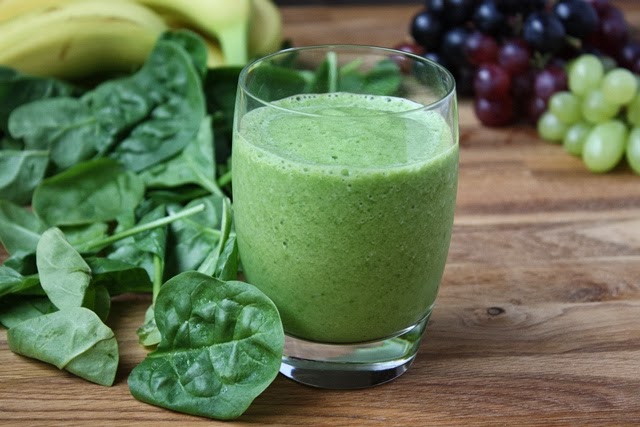Popeye was definitely on to
something. Spinach is a super food loaded with tons of nutrients in a low
calorie package.
Dark
leafy greens like spinach are important for skin and hair, bone health, and
provide protein, iron, vitamins and minerals. The possible health benefits of
consuming spinach include improving blood glucose control in diabetics,
lowering the risk of cancer, lowering blood pressure, improving bone health,
lowering the risk of developing asthma and more. This MNT Knowledge Center
feature is part of a collection of articles on the health benefits of popular
foods. It provides a nutritional breakdown of spinach, a look at its possible health
benefits, how to incorporate more spinach into your diet, and some precautions
to note when consuming spinach.
Nutritional breakdown of spinach
One
cup of raw spinach contains 27 calories, 0.86 grams of protein, 30 milligrams
of calcium, 0.81 grams of iron, 24 milligrams of magnesium, 167 milligrams of
potassium, 2813 IUs of Vitamin A and 58 micrograms of folate.
Most
of the calories in spinach come from protein.
Spinach
is one of the best sources of dietary potassium, weighing in at 839mg per cup
(cooked). To compare, one cup of banana has about 539mg of potassium.
A
lack of iron in your diet can affect how efficiently your body uses energy.
Spinach is a great non-hems source of iron, along with lentils, tuna and eggs.
Spinach
contains approximately 250mg of calcium per cup (cooked), however it is less
easily absorbed than calcium from sources like dairy products. Spinach has a
high oxalate content, which binds to calcium deeming it unavailable for use in
our bodies.
When
it's all said and done, our bodies can only absorb about 5% of the calcium in spinach
(about 12.5mg per cup) whereas the absorption rate from calcium in milk is
about 28% (300mg of calcium in one cup of milk at a bioavailability level of
28% would provide 84 mg per cup).
Spinach
is also one of the best sources of dietary magnesium, which is necessary for
energy metabolism, maintaining muscle and nerve function, heart rhythm, a
healthy immune system and maintaining blood pressure. Magnesium also plays a
part in hundreds more biochemical reactions that occur in the body.
Those
with digestive disorders, alcoholic, older adults and individuals taking
medications such as antibiotics and diuretics are more likely to have a magnesium
deficiency and should consume more leafy greens.
Spinach
also contains vitamin K, fiber, phosphorus and thiamine.
Possible health benefits of spinach
Diabetes
management:
spinach contains an antioxidant known as alpha-lipoic acid, which has been shown
to lower glucose levels, increase insulin sensitivity and prevent oxidative
stress-induced changes in patients with diabetes. Studies on alpha-lipoic acid
have also shown decreases in peripheral neuropathy and/or autonomic neuropathy
in diabetics.Of
note, most studies have used intra-venous alpha-lipoic acid and it is unsure
whether oral supplementation would elicit the same benefits.
Cancer
prevention:
Spinach and other green vegetables contain chlorophyll which has shown to be
effective at blocking the carcinogenic effects of heterocyclic amines which are
generated when grilling foods at a high temperature.
Asthma
prevention:
The risks for developing asthma are lower in people who consume a high amount
of certain nutrients. One of these nutrients is beta-carotene, of which spinach
is an excellent source. Apricots, broccoli, cantaloupe, pumpkin and carrots are
also rich sources of beta-carotene.
Lowering
blood pressure:
because of its high potassium content, spinach is recommended to those with high
blood pressure to negate the effects of sodium in the body. A low potassium
intake may be just as big of a risk factor in developing high blood pressure as
a high sodium intake.
Other
high potassium foods include potatoes, tomatoes, lima beans and oranges.
Bone
health:
Low intakes of vitamin K have been associated with a higher risk for bone
fracture. Adequate vitamin K consumption is important for good health, as it acts
as a modifier of bone matrix proteins, improves calcium absorption and may
reduce urinary excretion of calcium.
Promotes
regularity:
Spinach is high in fiber and water content, both of which help to prevent constipation
and promote a healthy digestive tract.
Healthy
skin and hair:
Spinach in high in vitamin A, which is necessary for sebum production to keep
hair moisturized. Vitamin A is also necessary for the growth of all bodily
tissues, including skin and hair. Spinach and other leafy greens high in
vitamin C are imperative for the building and maintenance of collagen, which
provides structure to skin and hair.
Iron-deficiency
is a common cause of hair loss, which can be prevented by an adequate intake of
iron-rich foods, like spinach.
Incorporating more spinach into your diet
Spinach
is a very versatile vegetable and can be eaten raw or cooked. It is available
fresh, frozen or canned. Here are some tips to try to incorporate more spinach
into your daily routine:
Incorporate
spinach into pastas, soups and casseroles.
Sautee
spinach in a small amount of extra virgin olive oil and season with freshly
ground black pepper and freshly grated Parmesan cheese.
Add
spinach to your wrap, sandwich or flatbread.
Make
a dip with spinach, like spinach and artichoke dip or spinach goat cheese dip.
Add
a handful of fresh spinach to an omelet or scramble, or throw a handful into a
smoothie (see recipe below).
Green pumpkin pie smoothie recipe
Ingredients
(makes 2 smoothies):
- 1/3 cup pumpkin
- 1/2 frozen banana
- 1/3 cup frozen mango chunks
- 1/2 cup spinach
- 1 cup unsweetened almond milk
- 1/2 teaspoon cinnamon
- 1/2 teaspoon nutmeg
- 2 teaspoons natural maple syrup
- 4 ice cubes
Precautions
If
you are taking blood-thinners such as Coumadin (warfarin) it is important that
you do not suddenly begin to eat more or less foods containing vitamin K, which
plays a large role in blood clotting.
Consuming
too much potassium can be harmful for those whose kidneys are not fully
functional. If your kidneys are unable to remove excess potassium from the
blood, it could be fatal.




















